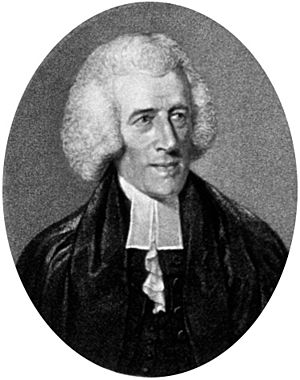Thomas Martyn facts for kids
Thomas Martyn was an important English botanist. A botanist is a scientist who studies plants. He was a professor at Cambridge University for many years. He helped people learn about the plant world. Sometimes, people confuse him with another person named Thomas Martyn. That other person studied shells and insects.
A Life Studying Plants
Thomas Martyn was born in 1735. His father, John Martyn, was also a famous botanist. Thomas followed in his father's footsteps. He went to school in Chelsea. Then he studied at Emmanuel College, Cambridge. He finished his first degree in 1756.
In 1758, he became a fellow at Sidney Sussex College, Cambridge. He also became a deacon in the church. The next year, he earned his Master's degree. He also became a priest.
In 1762, Thomas took over from his father. He became the Professor of Botany at Cambridge University. He held this job for a very long time, 63 years! His father had the same job for 29 years. Thomas Martyn taught classes until 1796. He stopped teaching because "the subject was not popular" then. In 1786, he became a member of the Royal Society. This is a group for important scientists.
His Books and Work
Thomas Martyn wrote many books about plants. Two of his main books are Plantæ Cantabrigiensis (published in 1763) and Flora Rustica. Flora Rustica was a big work with four volumes. It came out between 1792 and 1794.
He also translated a book by Rousseau. The book was called Lettres sur la botanique. In 1788, he published Thirty-eight Plates with Explanations. This book showed the plant system created by Linnaeus. Linnaeus was a very famous scientist who named and classified many plants.
Thomas Martyn was also a priest. He preached in church until he was 82 years old. After he passed away, a book was written about him and his father. It was called Memoirs of John Martyn, F.R.S., and of Thomas Martyn, B.D., F.R.S, F.L.S., Professors of Botany in the University of Cambridge.
Some of his other books include:
- The English Connoisseur (1766)
- The Gentleman's Guide in his Tour through Italy (1787)
- The Language of Botany (1793)
In 1807, he published The Gardeners' and Botanists' Dictionary. This book was an improved and bigger version of an earlier book by Philip Miller from 1731.
Images for kids
 | Anna J. Cooper |
 | Mary McLeod Bethune |
 | Lillie Mae Bradford |



